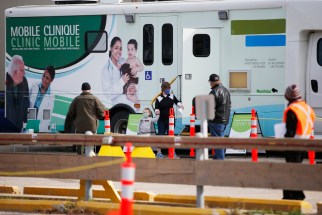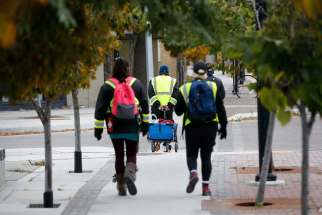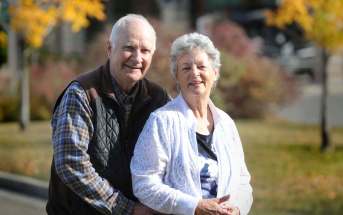Sad but sanguine snowbirds steel for winter at home
Read this article for free:
or
Already have an account? Log in here »
To continue reading, please subscribe:
Monthly Digital Subscription
$0 for the first 4 weeks*
- Enjoy unlimited reading on winnipegfreepress.com
- Read the E-Edition, our digital replica newspaper
- Access News Break, our award-winning app
- Play interactive puzzles
*No charge for 4 weeks then price increases to the regular rate of $19.00 plus GST every four weeks. Offer available to new and qualified returning subscribers only. Cancel any time.
Monthly Digital Subscription
$4.75/week*
- Enjoy unlimited reading on winnipegfreepress.com
- Read the E-Edition, our digital replica newspaper
- Access News Break, our award-winning app
- Play interactive puzzles
*Billed as $19 plus GST every four weeks. Cancel any time.
To continue reading, please subscribe:
Add Free Press access to your Brandon Sun subscription for only an additional
$1 for the first 4 weeks*
*Your next subscription payment will increase by $1.00 and you will be charged $16.99 plus GST for four weeks. After four weeks, your payment will increase to $23.99 plus GST every four weeks.
Read unlimited articles for free today:
or
Already have an account? Log in here »
Hey there, time traveller!
This article was published 05/10/2020 (1891 days ago), so information in it may no longer be current.
Judy and Bob Baker have been going to Arizona every winter for more than a decade, exchanging the face-freezing windchills and knee-high snowdrifts of a Winnipeg winter for flowers in February and fragrant citrus trees.
The warm weather was a boon to the couple’s mental and physical health, and the Bakers, who have been married for 55 years, enjoyed spending time with people in their own age group. Judy could take Pixel, their Jack Russell mix, on long walks without worrying about slipping on ice.
“You have a different community when you’re there,” says Judy, 77. “You almost have a different lifestyle that you’ve set up once you start going there. I was mixed chorus, my husband did a lot of golfing and pickleball for a while; we both used the gym and I use the swimming pools regularly. It’s a lovely way to spend your winter. We’ve been very lucky.”
But like many of Canada’s snowbirds, the Bakers are grounded this year owing to the novel coronavirus. The U.S.-Canada border remains closed to non-essential travel, but even if they could go, they wouldn’t.
“We have no desire to go back this year,” Judy says. “Hopefully next year, but we’ll just have to wait and see.”
The Bakers had left clothes behind in their rental when they had to leave in a hurry in March, fully intending to return. It was June or July when they realized they probably wouldn’t be going back to the U.S. this year — for a variety of reasons. Between the spiralling COVID-19 situation, the racial unrest, the wildfires and the upcoming election, “you just feel like the county is burning up, literally,” Judy says.
“We just felt it wasn’t a safe place to go at this time.”
“We have no desire to go back this year. Hopefully next year, but we’ll just have to wait and see.” — Judy Baker
Gail Peluk, 70, and Ted, her husband of 49 years, are staring down their first Winnipeg winter in almost two decades. The Peluks call Texas home for part of the year; back in 2001, they went to San Antonio for a few weeks, then explored the Rio Grande Valley the following year.
“(Our trips) just kept getting longer and longer: three weeks, four weeks, five weeks,” Gail says.
“Now we go for almost three months. We have a great family within our (RV) park. We just have a lot of fun down there, reconnecting with our American friends, Canadian friends, people we’ve met over the years who live not far from us; we meet in Texas, and now we’ve become friends back in Winnipeg and Manitoba.
“That’s just kind of how it is. We become a little family. We know who is going through a divorce, who’s had babies, who’s got grandbabies — we’re a family.”
Still, even if the border was open, Gail doesn’t feel comfortable making their annual drive. She’s concerned about the high rates of transmission in the county their RV park is located in. “I don’t want to get sick down there,” she says. If I’m going to get sick, I want to be home.”
“We have no desire to go back this year. Hopefully next year, but we’ll just have to wait and see.” — Judy Baker
While the plight of our nation’s snowbirds may seem like the most privileged of problems — “I understand this is a situation most people aren’t going to have grapple with in their lives,” Judy says. “We’ve been very fortunate and I certainly appreciate that” — she notes that the communities many Canadian seniors have built down south are a sustaining lifeline, particularly for those who already experience isolation during the winter months.
“I do think (people) have to think about the seniors in their lives and realize, ‘If they can’t get away, maybe I should try a little harder to go see them or keep in touch with them,’” Judy says. “Seniors do live a very isolated life, especially if they’ve lost a spouse or aren’t in a building like we are. I encourage families to be a little more in touch with the seniors in their life.”
For her part, Gail is taking a glass-half-full attitude towards a COVID winter.
“(I’m) sad in the sense that we’re staying for the whole winter, happy in the sense that I can see my family — like my grandchildren and my son,” she says. “Can’t see my daughter, granddaughter and son-in-law because they’re in Ottawa, so we can’t visit with them and they can’t visit with us. But, you know, on the whole, you have to go with a positive outlook and say, ‘Oh, it’s just a little roadblock.’ And everything, we hope, will have some normalcy within a year. We hope.”
jen.zoratti@freepress.mb.ca
Twitter: @JenZoratti

Jen Zoratti is a Winnipeg Free Press columnist and author of the newsletter, NEXT, a weekly look towards a post-pandemic future.
Our newsroom depends on a growing audience of readers to power our journalism. If you are not a paid reader, please consider becoming a subscriber.
Our newsroom depends on its audience of readers to power our journalism. Thank you for your support.




